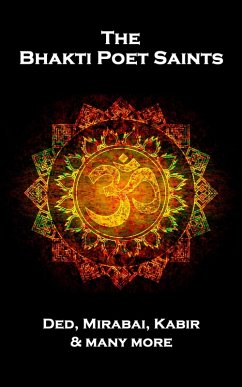Whilst Europe endured the Dark Ages in the 6th & 7th Centuries devotees of Shiva and Vishnu in Southern India were creating the Bhakti Movement. Some of these exponents, as in our volume, were bestowed with the title of saint but some had the additional title of sant, swami or goswami.
Broadly speaking, Bhakti poetry, as in Hinduism itself, is divided into 'Nirguna', the idea that the divine is formless as exampled by Kabir and 'Saguna' which interprets the divine as having physical form as captured by Mirabai.
The rapid spread, of the Bhakti movement, with its theme of love and devotion to God, proffered by these rebellious poet saints, did, over the following centuries, meld with much needed Hindu reforms and went to the heart of human existence. These 'God possessing' rather than 'God fearing' poets rejected hierarchies and intermediaries in their spiritual devotion and were critical of rules, regulations and ritual observances administered by Brahmin priests in the sacred but elitist court and temple Sanskrit.
Their poems, in their local language, emphasised personal devotion as a route to salvation with kind deeds and a humble life rather than ritual mediation, stretched the fabric of society. They were all from lower castes and many were women giving the movement an egalitarian spirit that helped reinforce the message that god's love was all-encompassing for every person willing to surrender to the divine.
Furthermore, their verse was accessible, simple, innovative with new poetic forms and often expressed in songs with a fierce passion and ecstasy that demonstrated the movement's focus on inner, mystical and authentic devotion and humility. Impromptu performances with provocative outbursts of singing and dancing in unconventional settings or public gatherings evolved into poetic presentations and community recitals as the rapid popularity of the movement spread. Although the language is every day and simple, many verses carry undercurrents of complex ideas, philosophical and psychological dilemmas, nuance and humour.
The legacy of the Bhakti poet saints has not only been in providing a rich vein of literature but unpacking universal truths that speak to mankind's spiritual quest.
This volume covers the spectrum of the significant Bhakti poet saints from its inception and reflects its regional spread.
Broadly speaking, Bhakti poetry, as in Hinduism itself, is divided into 'Nirguna', the idea that the divine is formless as exampled by Kabir and 'Saguna' which interprets the divine as having physical form as captured by Mirabai.
The rapid spread, of the Bhakti movement, with its theme of love and devotion to God, proffered by these rebellious poet saints, did, over the following centuries, meld with much needed Hindu reforms and went to the heart of human existence. These 'God possessing' rather than 'God fearing' poets rejected hierarchies and intermediaries in their spiritual devotion and were critical of rules, regulations and ritual observances administered by Brahmin priests in the sacred but elitist court and temple Sanskrit.
Their poems, in their local language, emphasised personal devotion as a route to salvation with kind deeds and a humble life rather than ritual mediation, stretched the fabric of society. They were all from lower castes and many were women giving the movement an egalitarian spirit that helped reinforce the message that god's love was all-encompassing for every person willing to surrender to the divine.
Furthermore, their verse was accessible, simple, innovative with new poetic forms and often expressed in songs with a fierce passion and ecstasy that demonstrated the movement's focus on inner, mystical and authentic devotion and humility. Impromptu performances with provocative outbursts of singing and dancing in unconventional settings or public gatherings evolved into poetic presentations and community recitals as the rapid popularity of the movement spread. Although the language is every day and simple, many verses carry undercurrents of complex ideas, philosophical and psychological dilemmas, nuance and humour.
The legacy of the Bhakti poet saints has not only been in providing a rich vein of literature but unpacking universal truths that speak to mankind's spiritual quest.
This volume covers the spectrum of the significant Bhakti poet saints from its inception and reflects its regional spread.
Dieser Download kann aus rechtlichen Gründen nur mit Rechnungsadresse in D ausgeliefert werden.


